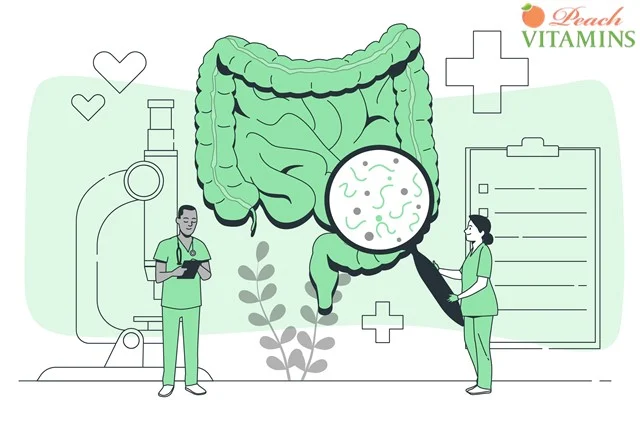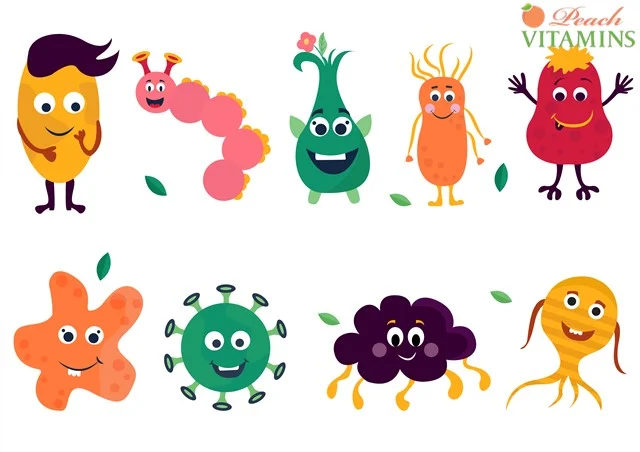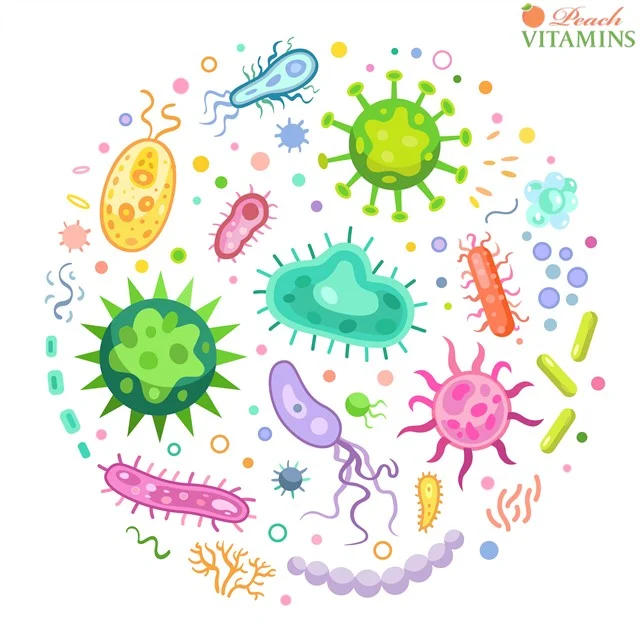Did you know that mushrooms contain potent antioxidants and anti-inflammatory properties? They also help with digestion and boost immunity.
Mushrooms aren’t just delicious; they’re healthy too! Mushrooms are one of the most nutritious foods available, and they’re high in fiber, protein, iron, zinc, selenium, vitamin D, B vitamins, and many others.
Mushrooms are great for gut health because they support the digestive system and promote overall wellness. This makes them the perfect food for anyone who wants to maintain optimal health.
I will share my top tips for eating mushrooms daily to benefit from these fantastic superfoods.

Are Mushrooms Good For Gut Health?
First, let’s get this out of the way: Yes, mushrooms are very good for our gut health. But how exactly do they help?
Well, mushrooms benefit your digestive system because they contain a lot of fiber. Fiber helps keep the colon healthy by regulating its activity and preventing constipation or diarrhea.
Mushrooms also contain vitamins and minerals such as selenium and potassium—two nutrients that help keep your immune system strong—and B vitamins like folate, riboflavin, and niacin (vitamin B6).
They’ve been used as medicine for centuries due to their antioxidant properties; this means they can neutralize free radicals in the body, which cause cellular damage that leads to disease development over time.
And last but not least: mushrooms have many bioactive compounds (like polysaccharides) with anti-cancer effects!
How Can I Cleanse My Stomach and Intestines Naturally?
You must make the right dietary choices if you’re eager to cleanse your body of harmful bacteria and other toxins. Be sure to steer clear of processed foods, which often contain unwanted chemicals. Instead, seek out whole foods that are free from these additives.
Here are some of our favorite gut-cleansing foods:
- Probiotic Foods: Yogurt and other fermented dairy products like kefir can help replenish the good bacteria in your digestive tract. If you’re not into dairy or have a milk allergy or intolerance, try taking a probiotic supplement. Add raw sauerkraut or kimchi (fermented cabbage) to salads or sandwiches for an added kick!
- Prebiotic Foods: Leeks are rich in prebiotic fiber that feeds healthy gut bacteria while improving digestion—a win-win!

Is Mushroom Good for Gastric Ulcers?
You probably didn’t know that mushrooms can be used to treat a gastric ulcer. Well, they can! Mushrooms are rich in polysaccharides and beta-glucans, which possess immunomodulatory properties. They also contain lectins, phytochemicals, and vitamins that help control inflammation in the gut.
Mushrooms also contain antioxidants such as ergothioneine and glutathione, which help protect the body from free radicals caused by stress or infection.
Free radicals are molecules produced during cellular respiration and normal metabolism. They cause damage to your cells if not neutralized by antioxidants like vitamin C or E.
What Are Good Probiotic Foods?
Probiotics are live microorganisms that help maintain gut health. They’re found naturally in foods like yogurt, kefir, kimchi, sauerkraut, miso soup, tempeh, and mushrooms.
But not everyone likes these foods because they taste bad or cause gas. So what should you eat instead?
Here are some probiotic foods that are delicious and healthy:
• Kefir (a fermented milk drink)
• Miso Soup
• Tempeh
• Kimchi
• Sauerkraut
• Yogurt
• Mushrooms
• Natto (fermented soybeans)
• Pickles
• Cheese
• Beer
• Wine
• Coffee
• Tea
Your cognitive function is closely linked to your gut health. When you feel sluggish, it’s likely due to poor brain function; the same goes for when you experience anxiety or depression.
The connection between your gut and your brain has been well documented. Researchers discovered that mice fed a high-fat diet had impaired memory and learning ability.

Polysaccharide Activity
Polysaccharides are a type of carbohydrate composed of long chains of monosaccharides. They can be found in various foods, such as mushrooms, potatoes, and legumes.
The primary purpose of lecithin is to serve as a fat emulsifier, which means that it helps other fats mix. It also acts as an antioxidant and can help lower cholesterol levels by preventing the oxidation of LDL cholesterol.
Gut Health
The gut microbiota is a complex community of microorganisms that live in our digestive tract. The gut microbiota plays a role in digestion, metabolism, immune function, and other bodily functions.
The gut microbiota composition is influenced by many factors, including genetics, diet, and lifestyle.
Medicinal Properties of Mushrooms
Mushrooms contain powerful nutrients that support gut health. They’re rich in fiber, protein, vitamins, minerals, antioxidants, polyphenols, and phytonutrients.
They help prevent cancer, heart disease, diabetes, obesity, arthritis, and depression. And mushrooms are delicious!
Here are some tips for eating mushrooms:
• Eat them raw or lightly sauteed.
• Add them to salads, soups, stir-fries, pasta dishes, and sandwiches.
• Use them as toppings for pizza, burgers, chicken wings, fish, and eggs.
• Include them in breakfast omelets, pancakes, waffles, muffins, granola bars, and smoothies.
• Make mushroom soup.
• Try mushroom risotto.
• Bake them in loaves of bread and cakes.
• Roast them in the oven.
• Grill them over charcoal.

The Prebiotic Effects on Your Heart Health
Prebiotics are non-digestible carbohydrates that feed beneficial probiotic microbes in the intestine. These microbes produce short-chain fatty acid synthesis (SCFAs), which have been shown to improve cardiovascular health.
Studies show that SCFA supplementation improves endothelial dysfunction, reduces blood pressure, lowers triglycerides, increases HDL cholesterol, and decreases insulin resistance.
Japanese mushrooms are high in dietary fibers, especially beta-glucans, which reduce blood glucose levels and increase satiety. Beta-glucan has been shown to improve lipid profiles and decrease inflammation.
Beta Glucans and the Diets of the Japanese
Beta-glucans are soluble fibers in oats, barley, rye, wheat bran, lentils, beans, nuts, seeds, and mushrooms.
In Japan, edible mushrooms are used as food supplements because they are believed to promote good health.
Japanese people eat more than 100 different types of mushrooms every day.
These mushrooms include shiitake, maitake, oyster, enoki, and reishi.
There is no doubt that shiitake mushrooms are one of Japan’s most popular mushrooms.
A high-cholesterol diet may cause atherosclerosis, which leads to plaque buildup in arteries.
Plaque buildup narrows the artery walls, making it harder for blood to flow through. This causes chest pain, irregular heartbeat, stroke, and even death.
But researchers discovered that mice fed a high-fat diet supplemented with shiitake mushrooms had significantly less plaque buildup than those not given the supplement.
This suggests that shiitake mushrooms can be an effective way to lower cholesterol levels.
Another study showed that shiitake mushroom extract reduced LDL cholesterol and increased HDL cholesterol in rats.
Researchers believe this effect could be due to the presence of beta-glucans in the mushroom.
But much research is still needed before we know if mushrooms like shiitake will work the same in humans.
So what about other mushrooms?
Other Mushrooms That May Help Lower Cholesterol Levels
Maitake is another type of mushroom that contains active compounds of beta-glucans. It also contains polysaccharides, which are complex sugars found in plants.
Polysaccharides are thought to play a role in lowering cholesterol by increasing bile acid production in the liver.
Oyster mushrooms contain chondroitin sulfate, which helps maintain cartilage tissue. Chondroitin sulfate is also known to help prevent joint damage from arthritis.
Enokis are rich in lignans, which are plant compounds that are similar to estrogen. Lignans are known to help regulate hormones and reduce menopausal symptoms.

Chaga Mushroom
The Chaga mushroom is considered a superfood in Russia. The Chaga mushroom is made up of polyphenols, which are antioxidants that protect cells against oxidative stress.
Oxidative stress occurs when free radicals overwhelm our body’s natural defenses. Free radicals are produced during normal metabolism, but too many can lead to cell damage.
Chaga mushrooms are rich in polyphenols, which act as powerful antioxidants. They have anti-inflammatory properties and may help fight cancer.
Chaga mushrooms are also rich in vitamin D, iron, calcium, zinc, copper, manganese, selenium, and phosphorus.
White Button Mushrooms
White button mushrooms also work with intestinal bacteria to produce short-chain fatty acids. These fatty acids are essential for maintaining gut health.
Short-chain fatty acids are also beneficial for weight loss. They increase energy expenditure and boost fat burning.
They also help improve insulin sensitivity and decrease inflammation.
These mushrooms are also rich in fiber, protein, vitamins B6, C, E, K, and folate.
Folate is essential for healthy brain development. Vitamin B6 supports immune function and protects against heart disease.
Vitamin C boosts collagen formation and strengthens bones. Vitamin E promotes healing after injury or surgery.
And vitamin K plays a crucial role in bone growth.
There are over 200 mushroom types; some are edible, while others aren’t.
Some mushrooms are toxic, and others are poisonous. There are, however, some mushrooms that are good for you.
If You’re Looking For Ways to Eat More Mushrooms, Here Are Some Tips:
Eat them raw. Raw mushrooms are more accessible to digest than cooked ones.
Cooking mushrooms makes them less nutritious.
Don’t overcook mushrooms. If they get mushy, it means they’ve been cooked too long.
Add mushrooms to soups, salads, stir-fries, pasta dishes, casseroles, and stews.
Add mushrooms to your favorite recipes. You’ll be surprised how delicious they taste!
You can even add mushrooms to smoothies. Just chop them into small pieces first.
Try making mushroom soup. Add chopped mushrooms to chicken broth and simmer until tender.
Make mushroom risotto. Cook rice in butter and olive oil. Then add sliced mushrooms and cook until tender.
Make mushroom quiche. Mix eggs, milk, cheese, and mushrooms together. Bake at 350 degrees F for about 30 minutes.
Make mushroom pizza. Layer mushrooms on top of whole wheat bread. Top with tomato sauce and mozzarella cheese.
Gut Microbiota
- The bacteria that live in your gut are called microbiota. Think of them like a diverse community of people who live together in a tight living space, like New York City or Boston.
- These microorganisms help with digestion and absorption of nutrients, immune system development, and brain development. They can also affect how we feel emotionally—for example, some studies suggest that depression may be linked to low levels of specific microbes.
- Gut microbiota is affected by what we eat, stress levels, and the environment around us—like pollution exposure or climate change.
Is Mushroom Good for Ulcerative Colitis?
If you have ulcerative colitis and are looking for a treatment to help maintain healthy gut microbiota, mushrooms may be the answer.
Mushrooms have been shown to reduce symptoms of ulcerative colitis and improve immune system function. In addition, they can help protect the body from infection by strengthening the digestive tract walls. This makes them an excellent choice for people with this inflammatory bowel disease (IBD).

Digestive Health
Gut health refers to the state of our digestive system. Our gut microbiome plays a significant role in maintaining healthy digestion and overall well-being.
Our gut microbiome consists of trillions of bacteria living inside us. These microorganisms help us break down food and absorb nutrients, and they also produce chemicals called short-chain fatty acids (SCFA) that nourish our cells and keep them healthy.
If we’re not eating enough fiber, these bacteria may be unable to process food properly. This leads to bloating, gas, constipation, diarrhea, and other gastrointestinal issues.
To maintain a healthy gut microbiome, eat plenty of vegetables, fruits, whole grains, beans, nuts, seeds, and herbs. Avoid processed foods, refined sugars, alcohol, caffeine, artificial sweeteners, trans fats, dairy, gluten, soy, and meat.
Conclusion
Medicinal mushrooms and gut health go hand in hand. Mushrooms are excellent sources of fiber, vitamins, minerals, antioxidants, and phytonutrients. They are also straightforward to digest and absorb.
They are also known for the health benefits of their rich protein contents, which may help support digestive health and healthy gut microbiota.
Maintaining a healthy gut is necessary for overall well-being. Knowing the different types of mushrooms available and how they can help you achieve this goal is essential.
There are many benefits from consuming mushrooms, including helping digestion, immune system function, and more!
